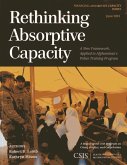In development, stabilization, and peace building, donors increasingly recognize the importance of being sensitive to the local contexts of their efforts. Yet the use of "blueprints" remains widespread. Even when standard approaches are modified for particular aid partners, there often remains a poor fit between donor efforts and local conditions. When recipients cannot absorb the aid and attention they are offered, the common response is "capacity building." While it is true that many aid recipients do not have adequate capacity for implementation, this report presents the results of a case study demonstrating that some security and justice programs are designed and implemented without an adequate appreciation of local desires, resources, capabilities, and challenges. Absorptive capacity, in other words, is a byproduct of the donor-recipient relationship. An earlier study by the authors introduced a new framework for measuring absorptive capacity. This volume applies it to security and justice sector programs that did not meet all of their objectives in Lebanon, Cambodia, and Colombia.
Bitte wählen Sie Ihr Anliegen aus.
Rechnungen
Retourenschein anfordern
Bestellstatus
Storno









